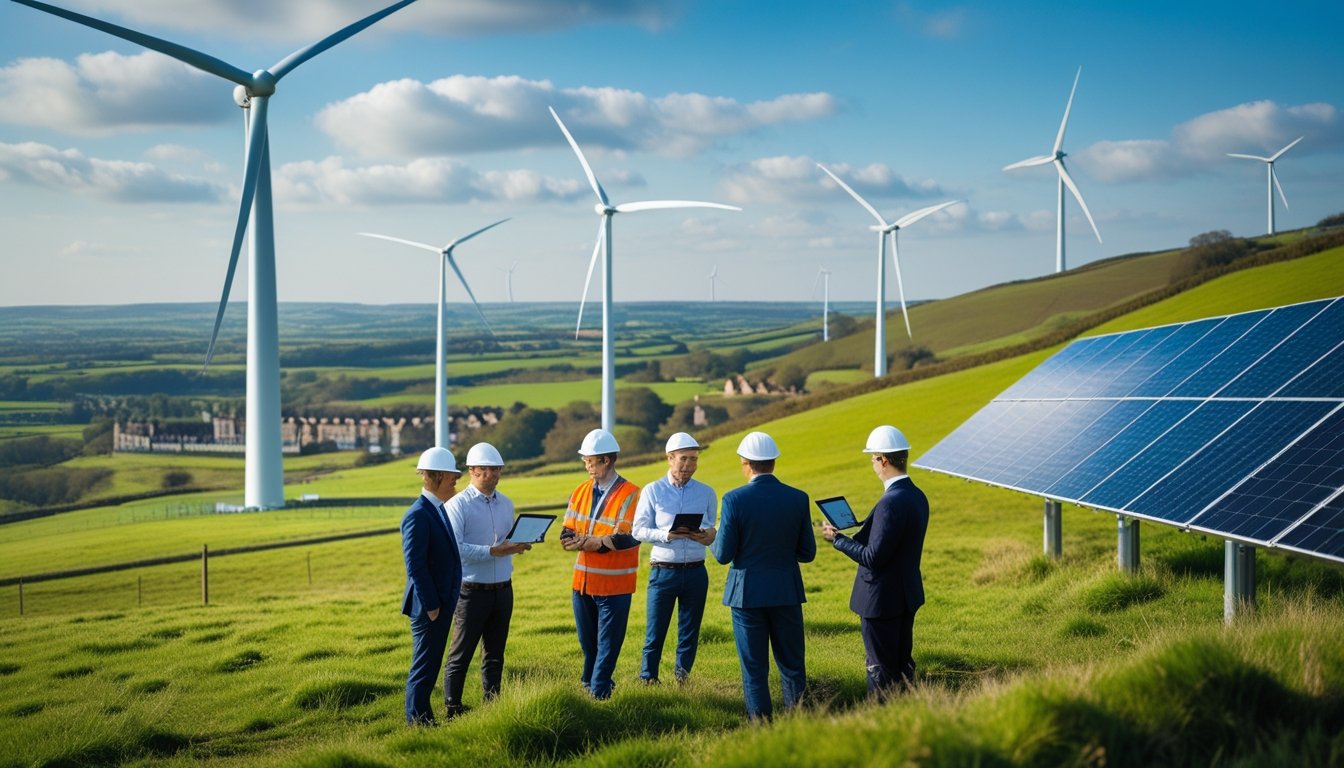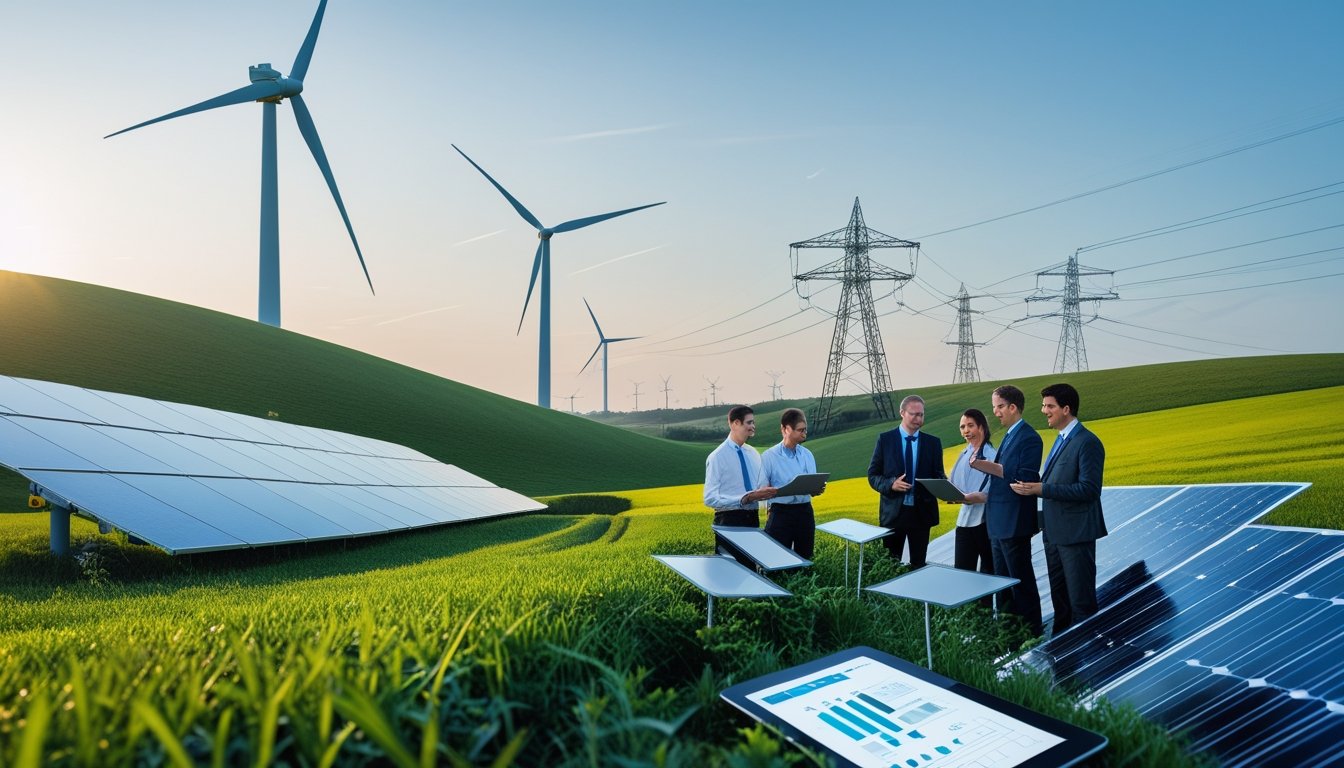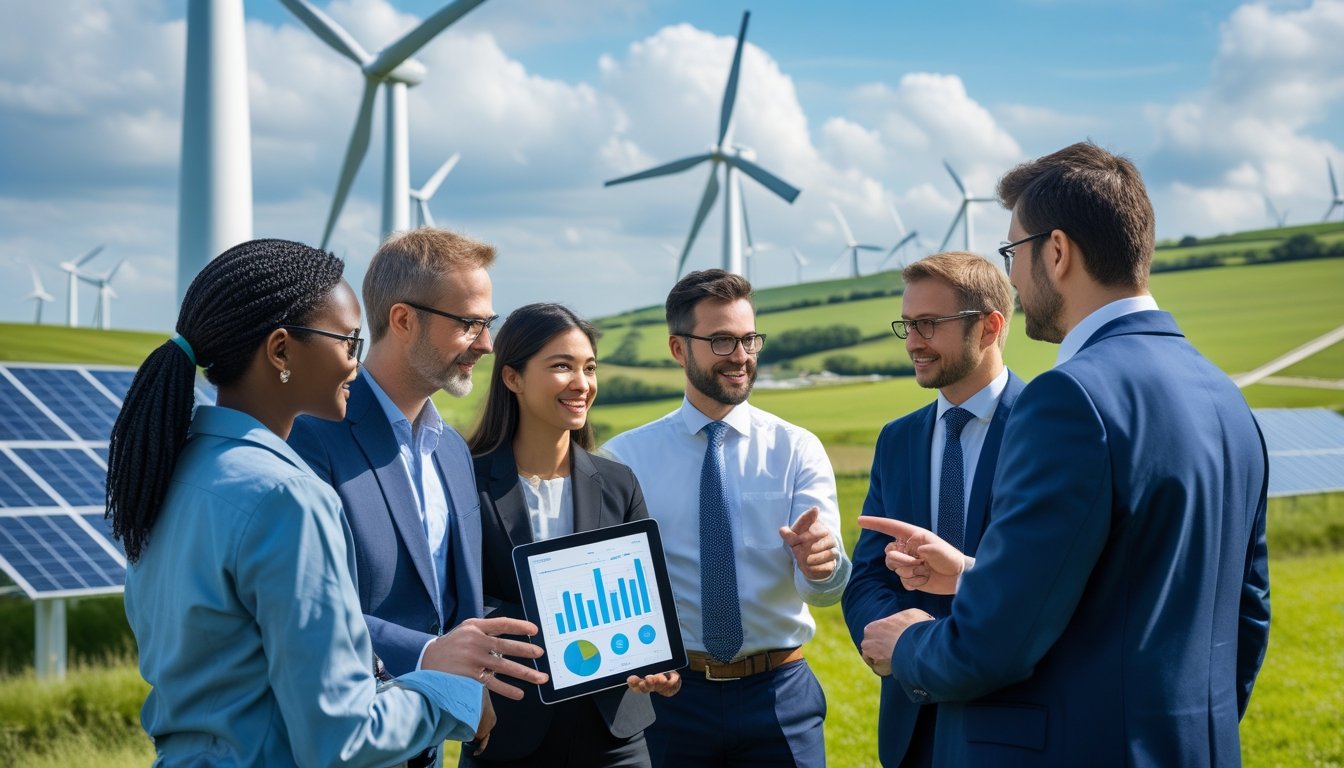Late updated: 11 Nov 2025 14:11
Written by: Amber Collins
Navigating The Transition To Renewable Energy In The UK: A Clear Path Forward
Navigating the transition to renewable energy in the United Kingdom involves a complex interplay of policy, technology, and investment. The UK has set bold targets, aiming to achieve a low-carbon, secure energy system by 2030, with renewable sources like wind, solar, and nuclear playing dominant roles. Our commitment to expanding renewable energy capacity is pivotal in addressing climate change and ensuring energy security for future generations.

Recognising the diverse challenges and abundant opportunities is key as we progress towards a sustainable energy future. The post-Brexit landscape, coupled with geopolitical tensions and evolving energy markets, demands strategic planning and innovation. By leveraging both domestic expertise and international collaboration, we can pave the way for a resilient and sustainable energy framework.
Investments in infrastructure and modernisation of the grid are crucial in supporting our ambitious renewable targets. The journey involves not just technological advancements but also significant policy shifts to facilitate a comprehensive energy transition. Engaging with communities, businesses, and stakeholders will be critical to achieving our shared goals.
Key Takeaways
- The UK aims for a low-carbon energy system by 2030.
- Challenges and opportunities exist in the renewable transition.
- Infrastructure investment is vital for energy goals.
Key Pillars of the UK's Energy Transition

Navigating the UK's energy transition requires focusing on legislative commitments, strategic policy drivers, renewable technology integration, and financial investments. By addressing these areas, we aim to create a resilient and sustainable energy future.
Net Zero Commitments and Legislative Framework
Our journey to net zero greenhouse gas emissions is underpinned by strong legislative frameworks. The Climate Change Act serves as the bedrock, mandating legally binding targets to reach net zero by 2050. This commitment ensures that emissions are reduced across all sectors.
Stringent regulations and accountability mechanisms guide public and private entities. National strategies prioritise comprehensive monitoring and reporting of emissions reductions. Combined, these actions foster a collaborative and transparent environment for achieving our climate goals.
Clean Power 2030 Targets and Policy Drivers
Clean Power 2030 constitutes a major step towards our sustainable energy vision. This initiative sets ambitious goals for increasing clean energy production. Policymakers have detailed action plans to transform the power sector, with energy efficiency and emission cuts taking centre stage.
Policy drivers include government incentives for low-carbon technologies and strategic industry partnerships. Alongside these, educational resources support public engagement, ensuring wide-reaching commitment to clean energy. Together, these efforts create a pathway to meet our 2030 targets while maintaining energy security.
Renewable Energy Technologies and Deployment
The deployment of cutting-edge renewable technologies is central to our energy transition. Essential technologies, such as offshore wind, solar farms, and hydroelectric power, are expanding rapidly. These sources are crucial for decarbonising the power generation system.
Energy storage solutions, such as grid-scale batteries, enhance grid stability by balancing supply and demand. Advanced systems allow excess energy from renewable sources to be efficiently utilised. This integrated approach ensures reliability, reduces reliance on fossil fuels, and paves the way for a predominantly renewable energy landscape.
Investment Requirements and Funding Challenges
Realising our energy transition ambitions requires significant investment. Funding, both from public and private sectors, is crucial for infrastructure upgrades and innovation. However, there are challenges in securing the necessary financial resources.
Policymakers focus on creating favourable investment conditions, such as tax incentives and subsidies. Nonetheless, the high upfront costs and long-term paybacks can deter investors. Overcoming these barriers demands robust financial frameworks, international collaboration, and public-private partnerships to ensure a smooth transition to a low-carbon economy.
Opportunities and Challenges in Delivering a Sustainable Energy Future
For the UK to achieve a sustainable energy future, various opportunities such as harnessing renewable resources and developing advanced technologies are crucial. We must also navigate challenges like building adequate infrastructure and ensuring energy security.
Offshore Wind and Solar Energy Expansion
Offshore wind and solar power are pillars of the UK's renewable energy strategy. Offshore wind offers vast potential due to the UK's extensive coastlines. These wind farms not only support energy goals but also generate employment in coastal regions.
Solar energy, particularly photovoltaic systems, is vital in diversifying the energy mix. The primary hurdles include integrating these sources into the grid effectively and reducing production costs. Nonetheless, advancements in installation and maintenance techniques are helping to overcome these barriers, enabling sustainable growth.
Building Hydrogen and Storage Infrastructure
Hydrogen stands as a game-changer in renewable energy, especially for industries reliant on heavy, continuous power. Constructing robust hydrogen infrastructure, including production and storage facilities, is essential for its large-scale implementation.
Energy storage systems, such as batteries, play a critical role in balancing supply and demand. However, high costs and limited storage capacities pose significant challenges. Investments in research to enhance storage technologies will aid in creating a more resilient energy network that can support the UK's sustainability objectives.
Energy Efficiency and Technological Innovation
Improving energy efficiency across sectors is both a cost-effective and environmentally friendly approach to reducing energy consumption. Innovation in materials and smart home technologies aids in driving efficiency gains.
Technological innovation extends beyond efficiency, paving the way for smarter grids and enhanced energy management systems. These innovations allow for real-time monitoring and more effective integration of diverse energy sources, all while minimising environmental impact.
Decarbonising the National Grid and Ensuring Energy Security
Decarbonising the national grid is crucial to reducing emissions and achieving climate targets. This involves not only incorporating renewable energy technologies but also implementing carbon capture and storage methods.
Ensuring energy security amidst this transition is another challenge. We must maintain a reliable energy supply while adapting to sustainable methods. This involves designing energy policies that balance reliability with environmental goals, thereby fostering a robust future energy system.
Frequently Asked Questions

The UK's transition to renewable energy involves specific targets, financial backing, and facing significant hurdles. We're seeing government initiatives supporting households and businesses, along with technological advancements shaping the future of energy.
What are the UK government's current targets for renewable energy adoption?
The UK government aims for a complete phase-out of coal power and a significant increase in wind and solar capabilities by 2035. Our goal includes hitting net zero carbon emissions by 2050, driven by various incentive programmes and stringent policy measures.
How is the transition to renewable energy being financed in the UK?
Government funding, private investments, and schemes like Contracts for Difference (CfD) play a vital role. These financial supports are critical in encouraging investment in clean energy projects, thereby facilitating the shift towards more sustainable energy sources.
What are the main challenges facing the UK in switching to renewable energy?
Complex regulatory environments and infrastructure limitations are among the primary concerns. There's also the matter of ensuring consistent energy supply while dealing with political and economic uncertainties that affect international and local energy dynamics.
What measures are in place to support households during the move towards renewable energy?
The government offers schemes such as the Energy Company Obligation (ECO) to improve energy efficiency in homes. Grants and subsidies for installing solar panels or home insulation are available, aiding in reducing costs during this transition.
How are businesses in the UK adapting to the shift towards renewable energy?
Businesses are increasingly investing in on-site renewable energy solutions and aligning with governmental sustainability goals. By adopting energy-efficient practices and integrating renewable technologies, they are leading the way in reducing carbon footprints.
What role does technological innovation play in the UK's renewable energy strategy?
Technological advancements in wind, solar, and energy storage are critical. Innovations help increase efficiency and reduce costs, making renewable energy solutions more viable on a larger scale. The focus is on driving innovation to meet ambitious emission targets effectively.
